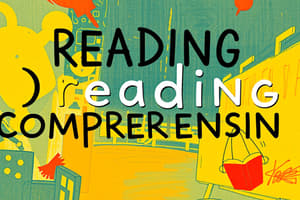Podcast
Questions and Answers
What is not a key skill involved in reading comprehension?
What is not a key skill involved in reading comprehension?
- Detail Recognition
- Speed Reading (correct)
- Vocabulary Knowledge
- Decoding
Which strategy involves creating mental images to enhance retention?
Which strategy involves creating mental images to enhance retention?
- Visualization (correct)
- Questioning
- Summarization
- Previewing
Which type of text aims to persuade the reader of a specific viewpoint?
Which type of text aims to persuade the reader of a specific viewpoint?
- Narrative Texts
- Persuasive Texts (correct)
- Expository Texts
- Functional Texts
In the context of reading comprehension, what does summarization entail?
In the context of reading comprehension, what does summarization entail?
Which of the following is a common question type used in reading comprehension assessments?
Which of the following is a common question type used in reading comprehension assessments?
What does detail recognition specifically involve?
What does detail recognition specifically involve?
Which strategy is best for getting an overview of a text before reading it thoroughly?
Which strategy is best for getting an overview of a text before reading it thoroughly?
What is the primary purpose of inference in reading comprehension?
What is the primary purpose of inference in reading comprehension?
What is an essential component for effective communication derived from reading comprehension?
What is an essential component for effective communication derived from reading comprehension?
Which type of text would most likely include instructions for using a product?
Which type of text would most likely include instructions for using a product?
Study Notes
Reading Comprehension
-
Definition: Reading comprehension refers to the ability to understand, interpret, and analyze written texts.
-
Importance: Essential for academic success, effective communication, and everyday functioning.
-
Key Skills:
- Decoding: Understanding the relationship between letters and sounds.
- Vocabulary Knowledge: Recognizing and understanding words.
- Inference: Drawing conclusions from the text beyond the literal meaning.
- Main Idea Identification: Recognizing the central theme or argument of the text.
- Detail Recognition: Identifying specific information and supporting details.
-
Strategies for Improvement:
- Previewing: Scanning the text before reading for an overview.
- Active Reading: Engaging with the text through note-taking, highlighting, or annotating.
- Summarization: Writing a brief summary of the text to capture its essence.
- Questioning: Asking questions about the text to enhance understanding.
- Visualization: Creating mental images based on the text for better retention.
-
Types of Texts Encountered:
- Narrative Texts: Stories that involve characters and plots.
- Expository Texts: Informative writing that explains or describes information.
- Persuasive Texts: Writing that aims to convince the reader of a particular point of view.
- Functional Texts: Everyday materials like instructions, advertisements, or schedules.
-
Common Question Types:
- Multiple Choice: Selecting the correct answer from given options.
- True/False: Determining the accuracy of statements based on the text.
- Short Answer: Providing brief responses to questions about the text.
- Fill-in-the-Blank: Completing sentences or phrases using information from the text.
-
Assessment Criteria:
- Understanding of the text: Ability to grasp the overall meaning.
- Accuracy of answers: Correctness of responses to questions.
- Use of evidence: Ability to cite specific parts of the text to support answers.
-
Practice Tips:
- Read a variety of texts regularly to enhance comprehension skills.
- Practice sample questions and tests to familiarize with the exam format.
- Discuss readings with others to deepen understanding and gain different perspectives.
Reading Comprehension
- Definition: Ability to understand, interpret, and analyze written texts.
- Importance: Crucial for academic success, effective communication, and functioning in daily life.
Key Skills
- Decoding: Recognizing the connection between letters and sounds for pronunciation.
- Vocabulary Knowledge: Comprehending and utilizing a range of words.
- Inference: Making logical conclusions that go beyond the text’s literal meaning.
- Main Idea Identification: Identifying the core theme or argument presented in the text.
- Detail Recognition: Spotting specific information and relevant supporting details.
Strategies for Improvement
- Previewing: Scanning text beforehand to gather essential ideas and structure.
- Active Reading: Engaging with the material through note-taking, highlighting, or annotating to enhance focus.
- Summarization: Crafting concise summaries to encapsulate key messages of the text.
- Questioning: Formulating questions on the content to deepen comprehension.
- Visualization: Forming mental pictures based on descriptions to aid memory retention.
Types of Texts Encountered
- Narrative Texts: Involve characters and narrative arcs, typically found in stories.
- Expository Texts: Informative writings designed to explain or clarify concepts.
- Persuasive Texts: Aim to convince readers of a particular viewpoint or argument.
- Functional Texts: Include practical materials like instruction manuals, advertisements, and schedules.
Common Question Types
- Multiple Choice: Selecting the correct response from various options.
- True/False: Assessing the correctness of statements based on text information.
- Short Answer: Providing brief explanations or responses to questions related to the text.
- Fill-in-the-Blank: Completing sentences with information directly from the text.
Assessment Criteria
- Understanding: Evaluation of the overall grasp of the text's meaning.
- Accuracy: Correctness of answers provided in response to the questions posed.
- Use of Evidence: Ability to refer to specific parts of the text to justify answers.
Practice Tips
- Regularly read diverse texts to strengthen comprehension skills.
- Engage with sample questions and tests to become accustomed to exam formats.
- Discuss readings with peers to enhance understanding and explore various perspectives.
Studying That Suits You
Use AI to generate personalized quizzes and flashcards to suit your learning preferences.
Description
Test your understanding of reading comprehension, a vital skill for academic success and effective communication. This quiz covers key components such as decoding, vocabulary knowledge, inference, and more. Evaluate your abilities and strengthen your reading skills.




